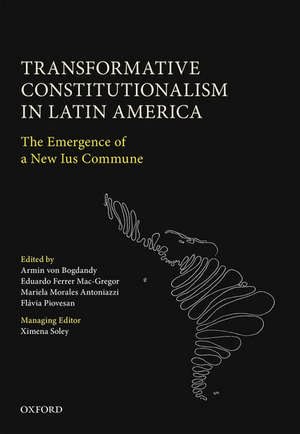Transformative Constitutionalism in Latin America: The Emergence of a New Ius Commune
Editat de Armin von Bogdandy, Eduardo Ferrer Mac-Gregor, Mariela Morales Antoniazzi, Flávia Piovesan, Ximena Soleyen Limba Engleză Hardback – 22 iun 2017
Preț: 826.34 lei
Preț vechi: 1181.64 lei
-30% Nou
Puncte Express: 1240
Preț estimativ în valută:
158.12€ • 165.51$ • 131.61£
158.12€ • 165.51$ • 131.61£
Carte tipărită la comandă
Livrare economică 19-25 martie
Preluare comenzi: 021 569.72.76
Specificații
ISBN-13: 9780198795919
ISBN-10: 0198795912
Pagini: 564
Dimensiuni: 179 x 252 x 31 mm
Greutate: 1.01 kg
Editura: OUP OXFORD
Colecția OUP Oxford
Locul publicării:Oxford, United Kingdom
ISBN-10: 0198795912
Pagini: 564
Dimensiuni: 179 x 252 x 31 mm
Greutate: 1.01 kg
Editura: OUP OXFORD
Colecția OUP Oxford
Locul publicării:Oxford, United Kingdom
Recenzii
This is a book addressed to inform the world about new scholarly and legal developments in Latin America. An invitation to model scholarship, political and judicial practise.
Notă biografică
Armin von Bogdandy is Director of the Max Planck Institute for Comparative Public Law and International Law in Heidelberg and Professor of Public Law at the University of Frankfurt/Main. He has been president of the OECD Nuclear Energy Tribunal as well as a member of the German Science Council and the Scientific Committee of the European Union Agency for Fundamental Rights; he has held visiting positions at the New York University School of Law, the European University Institute, the Xiamen Academy of International Law, and the National Autonomous University of Mexico, among others. Armin von Bogdandy is the recipient of the Leibniz Prize, the prize for outstanding scientific achievements in the field of legal and economic foundations by the Berlin-Brandenburg Academy of Sciences; the Premio Internacional "Hector Fix Zamudio,"; and the "Mazo" (gavel) of the Inter-American Court of Human Rights. His research centres on structural development in public law.Eduardo Ferrer Mac-Gregor is judge and vice-president of the Inter-American Court of Human Rights, as well as professor at the National Autonomous University of Mexico and researcher at the Legal Research Institute of that university. He studied law at the Autonomous University of Baja California obtained his PhD in law from the University of Navarra. He is director of the Iberoamerican Journal of Procedural Constitutional Law (Revista Iberoamericana de Derecho Procesal Constitucional).Mariela Morales Antoniazzi is a senior research fellow at the Max Planck Institute for Comparative Public Law and International Law in Heidelberg. She studies law at the Andrés Bello Catholic University, obtained her LLM at the University of Heidelberg and her PhD at the University of Frankfurt/Main. Mariela Morales Antoniazzi is visiting professor at various Latin American universities and vice-president of the German section of the Iberoamerican Institute of Constitutional Law. She coordinates the project Ius Constitutionale Commune en América Latina (ICCAL) at the Max Planck Institute for Comparative Public Law and International Law.Flávia Piovesan is professor of constitutional law and human rights at the Catholic University of São Paulo, where she holds a position in the human rights postgraduate programmes. She holds additional positions at the Catholic University of Paraná, and the human rights and development programme of Pablo de Olavide University, Spain. She was a human rights fellow at the Centre for Brazilian Studies, at the University of Oxford in 2005; and has been a visiting fellow at the Max Planck Institute for Comparative Public Law and International Law on numerous occasions. From 2009-2014 she was there as a Humboldt Foundation Georg Forster Research Fellow. Flávia Piovesan is a former member of the UN High Level Task Force on the implementation of the right to development and a member of the OAS Working Group working on the monitoring of the Protocol of San Salvador on social, economic and cultural rights. In 2016, she was appointed Special Secretary for Human Rights in Brazil.
